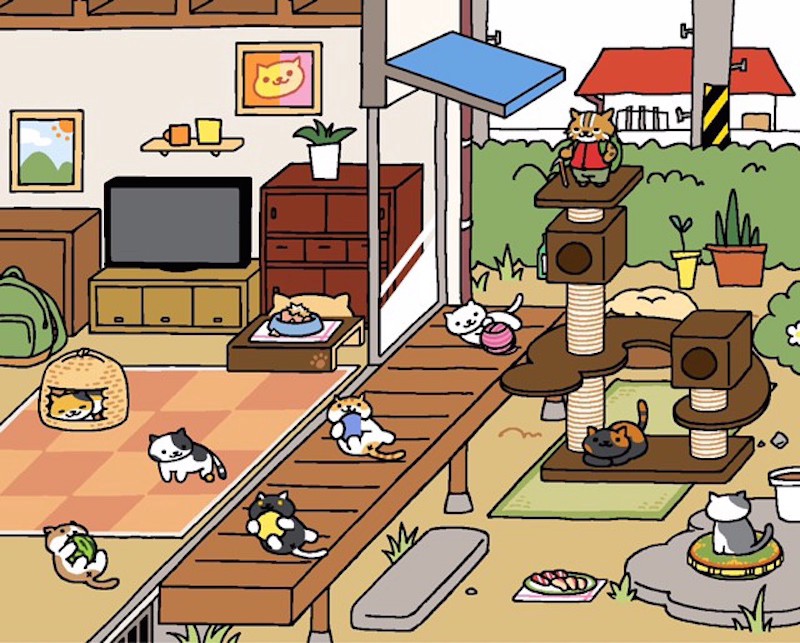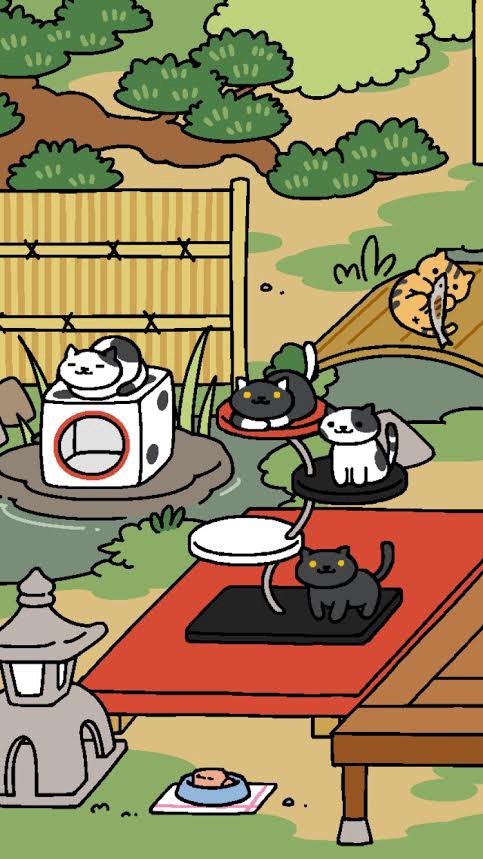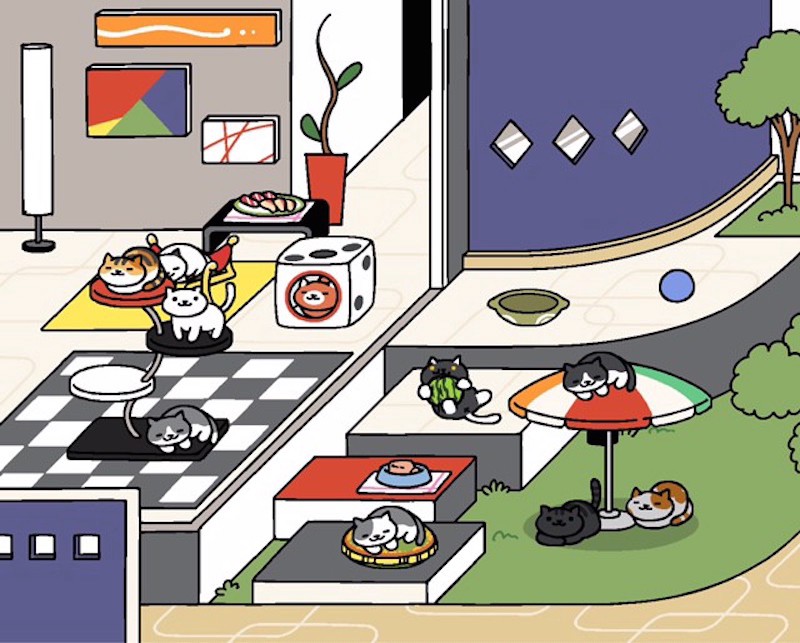On Neko Atsume and Lifestyle Creep

When I got a smartphone for the first time last month, one of the first things I did was download Neko Atsume, a Japanese cat game that I’d heard about from some friends.
I’d put off getting the smartphone for a while, by the way. One advantage of not having a smartphone had been tuning out many possible things to do or buy. (Sometimes it’s restful to not know what people are talking about. You can refill your drink while everyone else has a conversation about a show you don’t watch.) But collecting virtual cats has been a surprisingly fun lesson in the value of tuning in.
Neko Atsume is a deceptively simple game. You start with a small cartoon yard, in which you place cartoon food and toys. This summons cartoon cats, each one with a name and personality (“lady-killer,” “faint-hearted,” “boorish”). In return for your obedience to their unspoken whims, they leave you silver and gold fish. Once they really love you, they will leave a memento that you will treasure forever, like a dirty toy animal or a piece of fish jerky covered in claw marks. You can save up to expand your yard, then to remodel it in Zen, Western, Rustic, or Modern styles. When you do, more cats arrive.
In real life, I’m a renter, have always been a renter, and will be a renter for the foreseeable future. When I go back to visit family and friends in Wisconsin, everyone talks about owning a home. They talk about yard work. They talk about putting on additions. They talk about remodeling. I’ve always tuned out. I’m interested in real estate, but in the fantasy New York way of lingering too long over million-dollar apartment listings in realtors’ windows, and visiting especially beautiful homes, then crunching the numbers on Zillow. (I consider this the Snake Person version of “looking a gift horse in the mouth.”)
But in the world of Neko Atsume, I completely understand the appeal of remodeling. I love my yard, and I want to buy the nicest possible stuff to decorate it. Each new cat who shows up thrills me. I take multiple photos of each cat, hoping to capture them in every possible pose. One cat, Dottie, preferred to curl up on a pillow shaped like a sheep. When Dottie expanded her repertoire to a pink macaron, a sakura pillow, and an art deco cat tree, I remarked earnestly to a friend, “Dottie’s really coming out of her shell.” I said that. About a cartoon cat.
Another friend started playing a few days after me, and she started sending me screenshots of her cats. “How did she already get the yard expansion?!” I thought. “How did she already get Lady Meow Meow?! Is she spending real life money on this game?!”
I paused. Then I realized: I was jealous of my friend’s success in a game about cartoon cats.

I began to strategize. If I was going to get the yard expansion, I was going to have to save, and stop buying lots of little toys for my cats. I needed to focus on my goal.
My feelings about Neko Atsume began to parallel the feeling of saving up in real life. When I first moved to New York City, I worked in the cafe at Barnes & Noble and I started saving up for an MFA. In that case, the little cat toys that prevented me from saving were “meals out that weren’t sandwiches.” In both Neko Atsume and real life, you can save some money by buying cheaper food—but not enough. You still have to find other ways to cut back.
I stopped buying clothes, which was easy because I could only wear black to work. I had one black skirt, so I wore it every day. When I came into the store once on a day off, a coworker told me that he didn’t recognize me in pants.
I moved further away into a cheaper apartment with two roommates that I found on Craigslist. When I wrote rent checks, I sometimes asked in the memo section that they not be cashed until payday, and drew smiley faces. I got another job part-time, and then another. I was jealous when I heard about former classmates who had immediately landed impressive jobs, but I also knew that I was lucky to be able to cobble together a living in New York, and still be able to save for my next step. I started hosting readings on my roof. My co-workers and friends came to read their writing, drink ill-advised cocktails that combined ice cream and alcohol, and look across the river at the Statue of Liberty.
I started a 529 education savings account, and every time I got paid, I made a transfer. I also decided to make a small portfolio on ShareBuilder, where I didn’t need a minimum balance to choose a few stocks. I’d read that you should invest in what you know — so I invested in sandwiches. I hadn’t learned yet that it’s smartest to buy and hold, or that index funds tend to be smarter than picking individual stocks as a private investor, but I ended up breaking even. The real benefit was psychological: by transferring money out of my checking account, I could pretend that I couldn’t touch it. I labeled my 529 account “Dreams.”
While I was deciding whether or not to enroll in the graduate program that accepted me, I got an email that I’d been selected for a new poetry fellowship. This covered about half of my tuition. Since the program was in New York and I could take classes at night, I could keep working during the day to supplement my savings. I knew that I didn’t want to go into debt to get a master’s in poetry, and until I heard about the fellowship, I wasn’t sure if I was going to be able to make it work.
My Neko Atsume strategy also paid off. I saved up enough gold fish for the yard expansion, but the thrill wore off quickly. Then I wanted the Zen expansion. I kept seeing my friend’s screenshots of rare cats, and even though I was starting to collect a few rare cats of my own, it wasn’t enough. I wanted to keep up.
In video games and in real life, when I reach one level, I’m anxious to get to the next one. How do I stay grateful for what I have, while working as hard as possible for what I want? I haven’t figured out the secret yet, but I think it has something to do with staying open to surprise and delight — whether it comes from a cartoon cat or a particularly good sandwich.
I’m surprised by my genuine affection for the Neko Atsume cats. I’m not a cat person; in fact, I’m allergic. (Cats love me, which I consider proof of their villainy.) Still, I want every cat to visit me, even as I enjoy the ones that I’ve already seen. Neko Atsume makes it easy to focus on saving for your future cats, instead of enjoying the cats you already have. Maybe that’s why so many of us keep playing the game.

Abigail Welhouse is the author of the poetry chapbooks Too Many Humans of New York (Bottlecap Press) and Bad Baby (Dancing Girl Press). Subscribe to the Secret Poems of Abigail Welhouse to read a poem about the cartoon cats she’s grown to love.
Support The Billfold
The Billfold continues to exist thanks to support from our readers. Help us continue to do our work by making a monthly pledge on Patreon or a one-time-only contribution through PayPal.
Comments